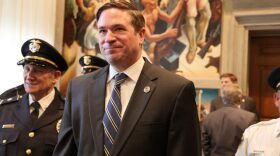A significant majority of Kansans support expanding Medicaid — including more than half of Republicans — according to the 2023 Kansas Speaks public opinion survey conducted by the Docking Institute of Public Affairs at Fort Hays State University.
The yearly, statewide poll tracks residents’ feelings about key public policy issues, from medical marijuana to housing to renewable energy.
When it comes to Medicaid expansion and abortion, it found that Kansans’ views largely do not reflect recent actions by the Kansas Legislature.
Medicaid expansion
Around 70% of Kansans said they support or strongly support expanding Medicaid, which is relatively consistent with findings from previous years.
That includes a majority of respondents from each political party. Nearly 55% of Republicans said they support expanding Medicaid, along with around 76% of Independents and 86% of Democrats.
Docking Institute Director Brett Zollinger said a change in how data was reported this year, and the inclusion of those who responded “I don’t know” to the question, resulted in the appearance of a slight dip in the portion of Kansans who support Medicaid expansion when compared with last year. Regardless of minor variances, Zollinger said Medicaid expansion has remained a broadly popular policy in Kansas over the years.
Around 65% of Kansans agreed or strongly agreed that those who might obtain health insurance as a result of Medicaid expansion deserve that benefit. A similar percent said that expansion would help rural hospitals remain in business.
Those views are out-of-step with the Republican supermajority in the Kansas Legislature, which has repeatedly blocked Medicaid expansion legislation from progressing in recent years. Democratic Gov. Laura Kelly has made the issue a top policy priority of hers this year, but expansion remains very unlikely to progress while Republicans are in power.
But Zollinger said Kansans’ support for Medicaid expansion won’t necessarily translate into action at the ballot box.
“Most people use a complex mix of information and position stances in order to decide who to vote for,” he said.
Just less than half of survey respondents said Medicaid expansion was an extremely important or highly important issue when deciding who to vote for for the Kansas Legislature. Around 35% said it was slightly important.
Studies have estimated that Medicaid expansion in Kansas would cover an additional 150,000 residents. New analysis from the Urban Institute estimates that a majority of those — 90,000 — currently do not have any health insurance.
Kansas is one of only 10 states that has not yet expanded Medicaid. Kansans are now less likely to have health insurance than the American population overall, according to Census data. Experts attribute that to the state’s failure to expand Medicaid. For years, Kansas outperformed the U.S. on health insurance rates.
Abortion
The survey found that a majority of Kansans remain supportive of abortion rights. More than 63% of respondents either agreed or strongly agreed that women are in a better position than politicians to decide whether or not they get an abortion.
Similar to the Medicaid questions, Zollinger said that a shift in data reporting methods this year accounts for part of the apparent dip in support for that question when compared to last year.
Just more than half of respondents said that the Kansas government should not place any regulations on the circumstances under which women can get abortions, compared with around 27% who disagreed. Kansas already has a number of abortion restrictions in place, including a ban after 22 weeks, ultrasound requirements and parental consent rules for minors.
Kansas lawmakers are barred from banning abortion by the state constitution, but Republicans in the Legislature were still able to pass smaller-scale abortion restrictions this year, including an “abortion pill reversal” law that’s tied up in the courts and a “born alive” law.
The survey also polled how Kansans felt about various scenarios in the event that the Kansas government bans abortion.
Around 55% of respondents disagreed or strongly disagreed with the statement that, if Kansas bans abortion, it should also ban women from seeking abortions in other states.
Around 18% said that they would be somewhat or very willing to report a woman who had an illegal abortion to authorities if the state banned abortion. Another 67% said they would not be willing at all, and another 15% said they did not know.
Respondents were split on the issue of who should pay the cost of prosecuting illegal abortions. Around 45% said the responsibility should fall on state government, around 11% pointed to local government, and around 45% said they did not know.
Alexandra Middlewood, an assistant professor at Wichita State University and chair of the political science department, said the large number of respondents who didn’t know how to respond to that question is itself telling of how Kansans feel about the issue.
“A lot of people may not have thought through some of these questions that they're being asked,” she said. “When you give them the option to say, ‘I don't know,’ you're actually getting a much more accurate portrayal of what Kansans actually think about these issues.”
Rose Conlon reports on health for KMUW and the Kansas News Service.
The Kansas News Service is a collaboration of KCUR, KMUW, Kansas Public Radio and High Plains Public Radio focused on health, the social determinants of health and their connection to public policy.
Kansas News Service stories and photos may be republished by news media at no cost with proper attribution and a link to ksnewsservice.org.
Copyright 2023 KMUW | NPR for Wichita. To see more, visit KMUW | NPR for Wichita. 9(MDA4OTAxNzAzMDEzMjc0MTc2MzA5ZDZlMw004))







